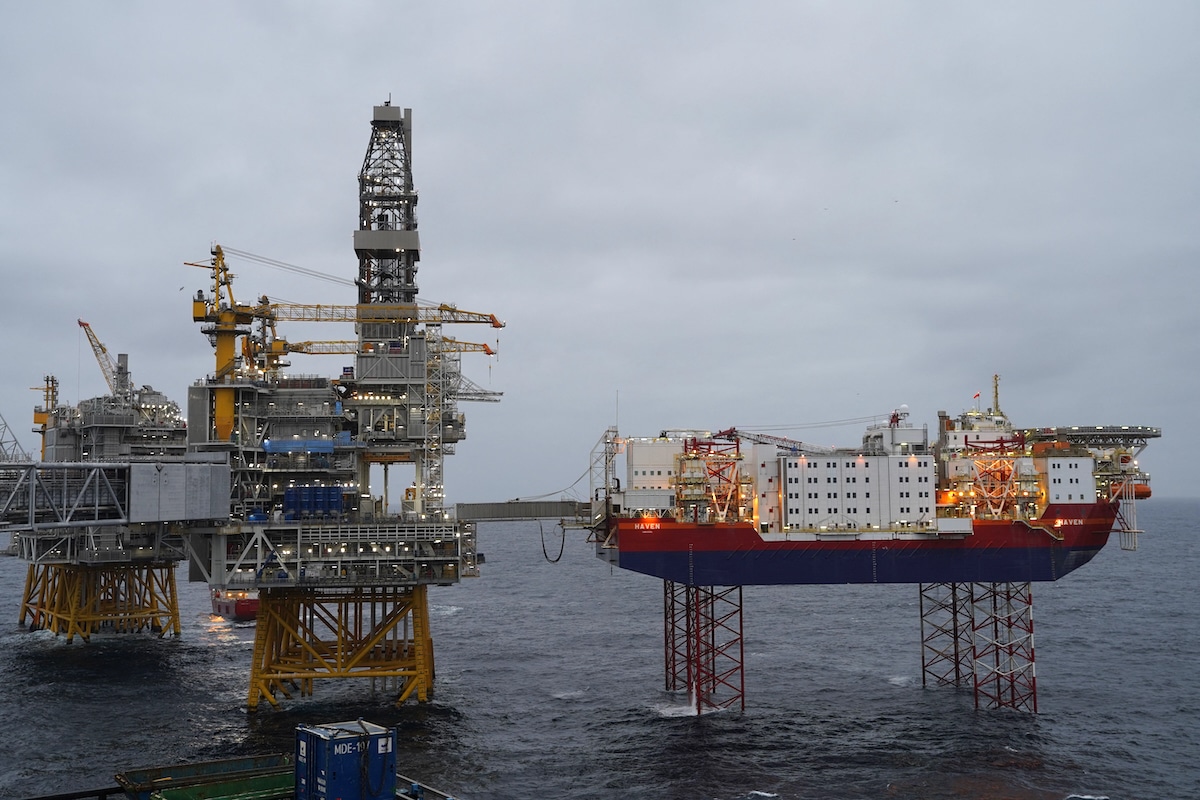Environmental Groups Ask Norwegian Court to Stop 3 Oil and Gas Fields in North Sea

 Why you can trust us
Why you can trust us
Founded in 2005 as an Ohio-based environmental newspaper, EcoWatch is a digital platform dedicated to publishing quality, science-based content on environmental issues, causes, and solutions.
Environmental organizations Greenpeace Nordic and Young Friends of the Earth Norway are asking an Oslo district court to stop the development of three oil and gas fields in the North Sea, citing a lack of adequate assessment of the global climate impacts of future fossil fuel use, according to Reuters and a press release from Greenpeace.
The lawsuit first began in June and surrounds the Aker BP and Breidablikk fields operated by Equinor. The two oil and gas fields together hold the equivalent of about 875 million barrels of petroleum, reported Reuters.
The environmental groups claim that Norwegian law, as well as the mandates of the Supreme Court, have been broken by the state and that children’s best interests have not been considered, the press release said. The organizations have filed a temporary injunction and say the three projects must cease immediately, as they violate not only international human rights law but the Constitution of Norway.
“Article 104 of the Norwegian Constitution and Article 3 of the UN Convention on the Rights of the Child require that the best interests of children be taken into account in matters that concern them. The environmental organisations point out that this must also apply to decisions on climate and oil management, and that the authorities are obliged to weigh the consequences of climate change against, for example, short-term corporate profits from oil extraction. As the consequences for children and young people have not been assessed for the three oil fields, and some of the fields will produce oil well into the 2050s, the environmental organisations assert that the approvals are also invalid on this ground,” Greenpeace wrote in the press release.
In 2020, the two environmental organizations lost a separate case in Norway’s Supreme Court involving drilling in the Arctic. Then, the court concluded that the government and parliament had the authority to allow new oil drilling, Reuters reported. However, in the same ruling, the court said total emissions impacts, including future burning of oil and gas, should be taken into account in the development of new petroleum fields.
In their new lawsuit, the environmental groups say future emissions were not taken into account by the energy ministry when the projects were approved, arguing that the district court should therefore invalidate the approvals and issue preliminary injunctions.
In rejecting their opinion, the state argued that the decisions of the ministry were legally valid and did not require the assessment of emissions impacts from exports of petroleum.
In a state visit to Norway, Dr. David Boyd, United Nations special rapporteur on human rights and the environment, said Norway should prohibit “further exploration for additional fossil fuels, since not all existing reserves can be burned while still meeting the commitments of the Paris Agreement” and should reject “any other expansion of fossil fuel infrastructure,” the press release said.
Oil production was begun by Breidablikk last month, four months ahead of schedule. Production by the other two companies, Tyrving and Yggdrasil, is scheduled to begin next year and in 2027.
“Norway’s aggressive fossil policy spells disaster for the climate and people around the world. We have no choice but to confront the Norwegian government in court over the illegal oil fields,” said Frode Pleym, head of Greenpeace Norway, as reported by Reuters.
In the new lawsuit, the environmental organizations claim assessments by the Ministry of Petroleum and Energy ultimately concluding that emissions by the Yggdrasil and Tyrving fields — predicted to produce more than seven times the current annual emissions of Norway — do not impact the environment or climate were made “behind closed doors” rather than via a public impact assessment, the press release said.
“With no basis in scientific evidence, but rather the controversially unscientific Rystad report, the Ministry has concluded that the Yggdrasil oil field will reduce global greenhouse gas emissions,” Greenpeace wrote. “For Breidablikk, no assessment of combustion emissions was made at all, despite the fact that the approval was granted after the Supreme Court’s ruling in the first climate lawsuit.”
Leading up to the United Nations COP28 Climate Conference in Dubai, which begins later this week, the environmental NGOs expressed concern about what the latest lawsuit means for Norway and the climate crisis.
“The new climate lawsuit in Norway is part of a larger movement to hold states and corporations accountable for the climate and nature crisis,” the press release said. “While the Norwegian delegation will try to portray Norway as a climate leader during this year’s fossil-fuelled COP28 in Dubai, the organisations will also face the state in court precisely because of a climate-hostile oil policy.”
Subscribe to get exclusive updates in our daily newsletter!
By signing up, you agree to the Terms of Use and Privacy Policy & to receive electronic communications from EcoWatch Media Group, which may include marketing promotions, advertisements and sponsored content.

 233k
233k  41k
41k  Subscribe
Subscribe 




